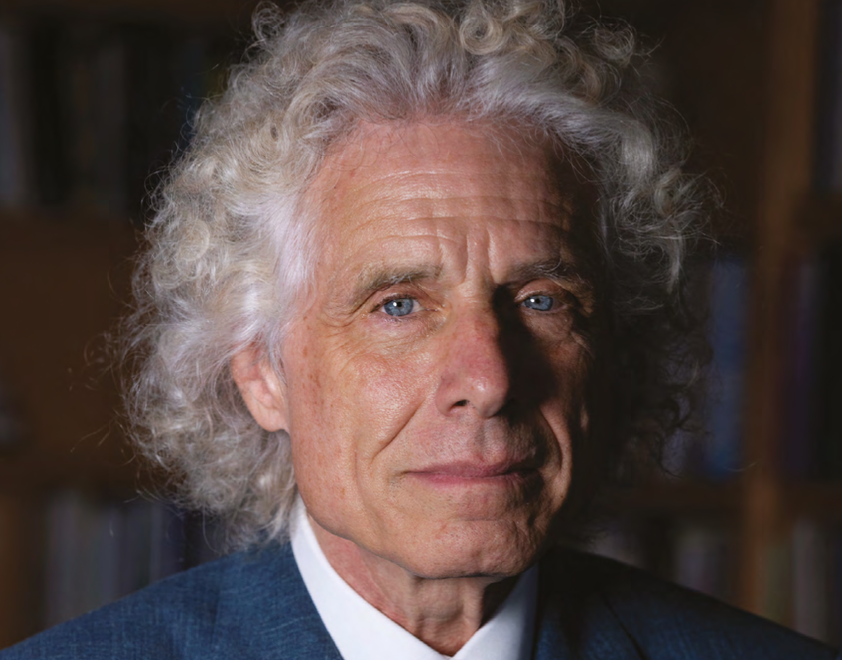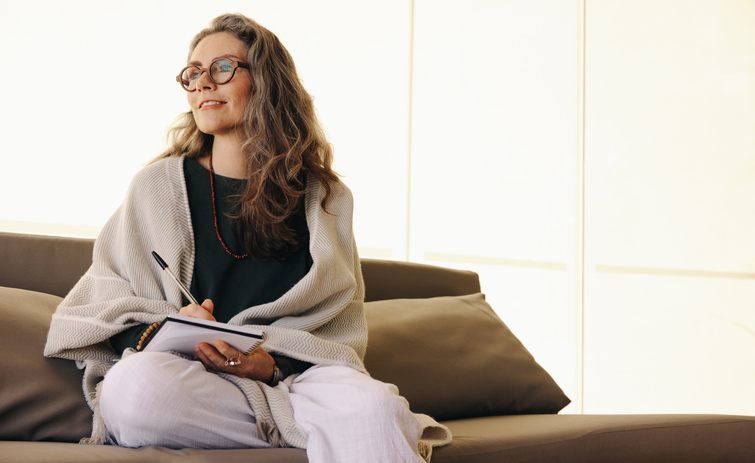By Rob Lutes
This cognitive psychologist and bestselling author argues that despite what we see on the news, things are getting better, not worse
What was your experience of growing up in Montreal?
I grew up in two western suburbs of Montreal: Montreal West and Côte-Saint-Luc. I’m a baby boomer, so I grew up during a time when kids were allowed to run around and get bored and get into trouble without constantly being supervised by their parents. So, like many baby boomers, I treasure that freedom. I was too young for the student protests at the universities, but older brothers and sisters of friends were participants. I read eagerly and was shaped by the 1960s, by the change in norms and standards and mores from the rather uptight ’50s.
Were your parents first-generation Canadians?
They were born in Canada. My grand-parents were born in Europe, one in what is now Moldova and the other three in Poland. All four came in the mid ’20s. My mother’s parents had relatives in New York, but they chose to go to Canada, and I’m guessing that was because the United States had passed a restrictive immigration law in 1924. Canada may have been their second choice, but it was to my good fortune because I was very happy to grow up in Canada.
Did your parents influence your becoming an academic?
Both my parents were very intelligent, but my mother was the more intellectual of the two. I think their assumption was that I would become some kind of professional, ideally a doctor. My mother encouraged me to be a psychiatrist, saying that if I was interested in the mind, why not go into a profession where I could earn a living? At one point when I was a teenager, I said to my mother: “I like to think. I like to solve problems. I like to ponder ideas and theories. I’ve heard that there’s this thing called a think tank. Do you think I could try to get a job in a think tank?” She said: “Wow. If what you’re interested in is thinking, your place is in a university.” So she did plant the idea of becoming a professor in me. And I did grow up in a house that had books and magazine subscriptions and conversations over the dinner table, so there was an interest in ideas.
Your work branches into many areas—philosophy, literature, anthro- pology, history…. What brought you to psychology?
I found psychology at Dawson College, in the Quebec CEGEP system. It hit a sweet spot, raising profound questions about human nature but doing so in a way that was empirically tractable. That is, you could make progress by doing the studies and getting the answers to questions. McGill University, where I got my undergraduate degree, had a pretty healthy representation of psychologists of language on its faculty. So that was where that influence came from.
It seems that, professionally, you have several different roles: researcher, professor, writer, and public intellectual.
I like to have a mixed portfolio so I don’t spend all my time doing one thing. I do like teaching. For 30 years, I’ve been teaching a big introductory course in my department at MIT and another at Harvard, courses that a lot of the better-known faculty try to avoid. And I teach a lecture class on rationality. Teaching overlaps with my interest in writing because in both cases, I try to make difficult ideas accessible to smart, curious people who just happen not to have specialized in what I specialized in. And I like research. I’m curious enough that not all my questions about the world and about human nature have already been answered. So I like to be part of the profession that tries to increase our knowledge by doing studies, by doing experiments, by analyzing data.
And I enjoy the activity of writing. It’s doubly interesting to me because not only is it a challenge to make the crossover from dry, turgid academic writing to more accessible popular writing but since I’m interested in language, I’m also curious about what it is that makes a sentence compelling to a reader—what makes it vivid, what makes it clear—which is why I wrote the book The Sense of Style. And I like contributing to the global conversation in ideas. And in a number of my books, I’ve tried to advance the conversation on topics like progress, human nature, violence, and even politics.
Your earlier books were quite technical, but your work has become more popular in nature. Do you see that as a mandate, to share your ideas widely with the public?
Yes, very much so. Universities have tax-free status in the United States, so I think there is some responsibility to give back, to share the fruits of research and ideas and debate with the larger, curious public.
Your recent books, The Better Angels of Our Nature, Enlightenment Now, and Rationality, have argued that the world is improving, that things are getting better. People watching the news might not agree with that view.
Writing those books, I think I was initially responding to the discomfort that people have with the very idea of human nature, that evolution has given us a number of emotional and cognitive traits. People are often horrified by the notion of human nature because they think that it removes any possibility of progress—as in “You can’t change human nature.” It seems much more comforting for people to think that we’re blank slates and that we could be re-engineering child-rearing and culture and education and perhaps create a better kind of human, one not saddled with all of the ugly traits that evolution fitted us with.
My counter-argument is that human nature is complex. We’ve got lots of different traits that push and pull us in different directions. We have selfish and aggressive and foolish traits, but we also have a capacity for reason. We have a sense of empathy and a cap- acity for self-control. So we don’t have to act on all of our impulses. There- fore, actual behaviour depends on what features of human nature are engaged by our environments. Our environments can change over time. And here’s the punch line: they have changed over time. If you simply look at measures of violence over time, you see that there has been massive improvement. This is something that’s invisible to anyone who gets their understanding of the world only from the news, because the news is a non-random sample of the worst things that happen on earth on any given day. In a world of eight billion people, there will always be something terrible happening somewhere, and that’s what the news gives you.
But in many spheres, there has been incremental progress. It’s invisible in the news because if a country is not at war, it’s not a headline. And if, say, lifespan goes up by a few percentage points, if poverty goes down by a few percentage points, that can have a massive effect over time, but there’s never a Thursday in October when it generates a headline. By concentrating on data rather than headlines, I discovered that there’s a much more encouraging picture of the state of the world—namely, that progress has occurred. Life expectancy has more than doubled. Global poverty has decreased by a factor of 10. Deaths in wars have fallen by a factor of five to 10.
Now, this doesn’t mean there’s some mystical thing called progress that magically makes everything bet- ter all the time—things can get worse. Things have gotten worse in some ways, but they have gotten better in many ways that people are com- pletely ignorant of.
What’s your writing process?
When I start a writing project, I have this background buzz of anxiety until I finish. So I like to work intensively.
I try to set aside all possible distractions. I work evenings, and I work weekends. I make time for life, for exercise, for spending time with my wife and family and friends, but I carve out time whenever I can find it.
If you had to give advice on aging, what would it be?
It’s a poignant question for me because tomorrow I turn 70. Let’s see…. Cultivate a sense of gratitude. All of us are subject to tragedy, but there are, considering all of the things that can go wrong in life, a lot of things that go right. Part of human flourishing, of mental health, is to appreciate what has gone right in your life.
Another is, obviously, stay healthy— exercise, fasten your seat belt, wear a bicycle helmet, recognize that the physical world is unforgiving and that we are in a battle, all of us, against death. It gets harder as you get older, but do everything you can to push back. Another thing is don’t surrender to aging in the sense of losing your intellectual curiosity, your taste for new experiences, your engagement with the social and physical and cultural worlds.






